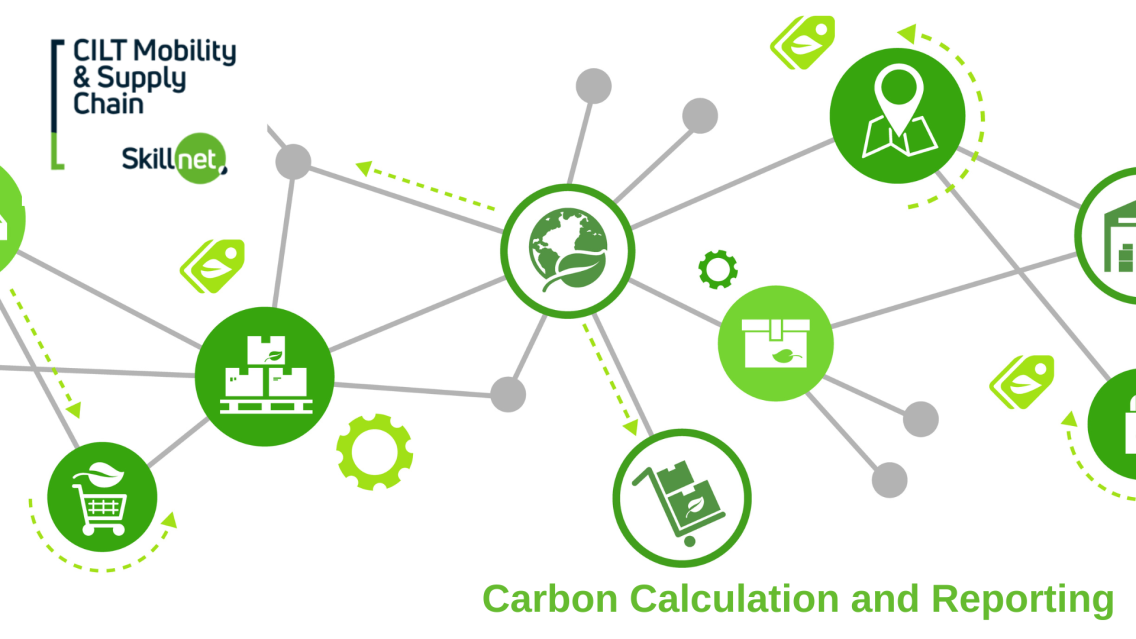Start date: 21 June 2024
Duration: 9:30am - 12:30pm
Location: Online: Microsoft Teams (Half-Day)
Certificate: Digital Badge Certificate awarded by the IEA
Cost: €300
Course code: 19740

Programme overview
The Sustainable Supply Chains: Carbon Calculation and Reporting course is the second step in the Sustainable Supply Chains training programme which has been developed to provide companies with practical support to reduce their greenhouse gas emissions throughout their supply chains.
Carbon Calculation and Reporting is a practical and interactive course that trains participants on how to calculate their organisation’s supply chain emissions using practical tools such as the Global Logistics Emissions Council (GLEC) Framework for freight and logistics. Participants will understand the transport chain and how to assess their organisation’s impact from freight transport. Participants will also be shown options for reporting emissions to clients, supply chain partners and investors.
This course is delivered virtually by the Irish Exporters / Association (IEA)
The course is significantly subsidised at €300 from €399
Who Is This Course For?
- Senior Management
- Heads of Sustainability and Sustainability Officers
- Supply Chain Managers
- Logistics Managers
- Operations Managers
Course Content
The Carbon Calculation and Reporting training workshop consists of 8 modules:
Module 1: Foundations and Context
Module 1 highlights the challenge of reducing transport emissions despite the significant projected growth in trade volumes up to 2030 and beyond. Participants will learn of the specific challenges Ireland faces with an economy heavily reliant on exporting goods off the island.
Module 2: Calculation
Module 2 will review the basic math’s and principals involved in calculating greenhouse gas emissions throughout the supply chain. Participants will learn of the Global Logistics Emission Council (GLEC) which provides a global framework for calculating carbon emissions from transport and logistics. The key steps in the GLEC framework will be outlined.
Module 3: Transport Chain
Module 3 will assess the key modes of transport covered by the GLEC Framework: Air, Rail, Road, Sea, Inland Waterways and Logistics Sites and the associated carbon intensity of each mode. Participants will then learn the difference between boundary and scope when calculating their organisation’s greenhouse gas emissions.
Module 4: Boundary
Module 4 will outline how to set the boundaries for carbon accounting and what a company should and should not include in their calculations. The credibility of different types of data sources will then be discussed followed by guidance on how to set ambitious but achievable science-based targets.
Module 5: Scope 1
Module 5 will address scope 1 direct emissions from fuel usage, how to take accurate readings from fuel pumps, how to account for uncertainty and how to best report the data.
Module 6: Scope 2
Module 6 will address scope 2 indirect emissions from purchased energy and how to calculate emissions from electricity and energy bills.
Module 7: Scope 3
Module 7 will address scope 3 indirect emissions from outsourced logistics and supply chain activities and the responsibilities companies have for these indirect emissions.
Module 8: Considerations
Module 8 will review the math’s and key takeaways from the course on how to calculate direct and indirect emissions. Participants will be shown how to access the GLEC framework and will be shown other emissions calculation and reporting tools that can be used inhouse.
Learning Outcomes
By the end of the course, participants will:
- Understand the enormous challenge Ireland faces to reduce greenhouse gas emissions by 51% by 2030 despite the predicted growth in trade volumes.
- Understand the different modes of transport covered by the GLEC Framework and their comparative carbon intensity.
- Understand how to set boundaries for carbon accounting and the basic math’s for making calculations.
- Understand the differences between scope 1, 2 and 3 emissions and what emissions a business is responsible for.
- Learn how to use the GLEC Framework to measure emissions from freight and logistics throughout the supply chain.
- Learn how to report emissions to clients, supply chain partners and investors using reporting standards.
- Learn how to access the GLEC Framework and other practical tools for adoption within their organisation.
Course Evaluation, Assessment & Grading
Participants will be asked to complete an online quiz at the end of the training workshop to demonstrate they have understood the key concepts of the course.
Certification
Each participant will be awarded a digital badge certificate awarded by the Irish Exporters Association.
The digital badge contains verifiable data on skills attained and can be downloaded for use in digital CVs, e-portfolios and email signatures and for sharing on social media platforms.
Terms & Conditions
Feel free to read our Terms & Conditions here.



